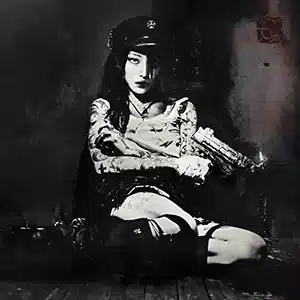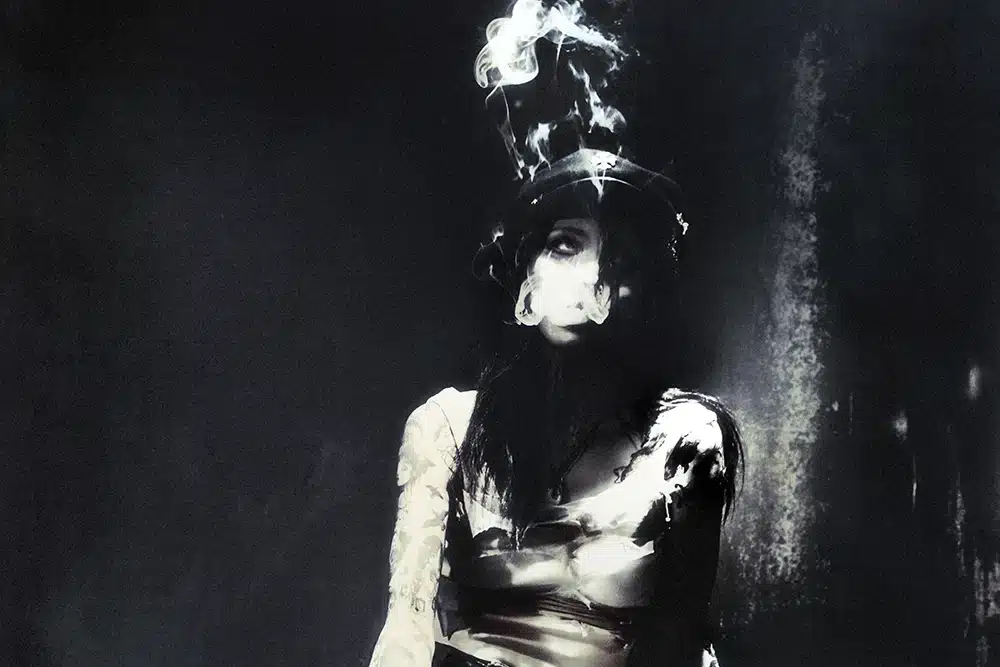
Yeule has come a long way from their early years traveling distant galaxies. Ćmiel’s melodies are exemplary pop, and their vocals exude an incorporeal flair.
 Evangelic Girl Is a Gun Yeule Ninja Tune 30 May 2025
Evangelic Girl Is a Gun Yeule Ninja Tune 30 May 2025
Nat Ćmiel, also known as Yeule, has consistently flirted with and aspired to pop glory. Even with 2022’s Glitch Princess, which featured them circling the atmosphere like a suicidal alien sizing up our blue orb, they displayed an uncommon pop sensibility. Sure, the set oozed disembodiment and downtempo paranoia, but clearly Cmiel wasn’t as “out there” as they seemed. Perhaps, somehow, a steady dose of radio-friendly hooks had been piped into their spaceship.
Yeule broke the atmosphere on 2023’s softscars, occurring as a quick learner when it comes to dissecting human affairs. Even though they resembled a cross between a melancholy cyborg and a gothic implant from a video game, they sang songs that dripped with sensuality, exploring the human condition via catchy tunes and well-layered instrumentation.

Much as the Spanish poet Lorca was the figure who best captured the Depression-era/capitalistic machinations of America (via his collection Poet in New York, written in 1929-1930, published in 1940), so Ćmiel brandished their skills of observation and absorption, conveying with remarkable clarity what it’s like to be a mammal/human being/cultural aspirant living in the 2020s.
With their latest album, Evangelic Girl Is a Gun, Yuele has both feet on the sidewalk. Flirtations, rejections, bipolar leanings, crushes, heartbreaks, all the boons and fallouts of craving and impermanence are present. Lyrically, they may still be trying to reconcile any number of impulses – terrestrial and extraterrestrial – but they’re garbed and psyched for pop primetime.
Opener “Tequila Coma” is possibly a surreal take on a spring-break blowout. “Naked on the marble floor / and all my lovers crucified on all fours,” they sing, their voice conjuring an AI function newly transformed into a sentient being. Ćmiel’s voice soars and dips, aptly displaying their vocal range. A glitchy guitar solo furthers a garage-y feel. The track would be equally appropriate at a high school sock hop and an after-hours nightclub.
With “The Girl Who Sold Her Face”, Ćmiel obliquely addresses the process of commodification, particularly in the music and film business, voicing how being “a star” is an illusion. They’ve deduced quickly: on earth, if it glitters, it probably ain’t gold. Ćmiel’s melody is bubblegum-ready, even as their message brings to mind a cross between confessional graffiti and psychiatric notes. “She is picture-perfect porcelain”, they sing, as if to suggest that “she” is also easily breakable, a product that shatters upon contact.
“Eko” is straightforward pop with a dollop of psychedelia (“Acid tripping silver spinning scrape inside my head”). Brimming with mixed-down guitars and semi-dancey beats, the piece unfolds as a paean to a love interest and a barbed self-evaluation. “1967”, meanwhile, is a sludgier, fringier take that recalls Rina Sawayama. Ćmiel does her best druggy-slacker impression, offering snapshots of “the grime” and “boys who want to die”. Woozy beats and guitar parts, along with nu-metal accents, serve to shove their voice into the forefront, Ćmiel sounding like a diva who’s going through heroin withdrawal.
Occasionally, Ćmiel drifts into an overly straight-pop approach, losing track of the charged iconoclasm and strained theatrics that give her tunes a signature tone. “Dudu”, for example, is a bit flat, stripped of viable tensions. “Vv” is designed to be a self-revealing confession to a bestie/love interest, but tilts toward sentimentality, despite including memorable lines (“I treat time like nothing because it’s not real”, “I don’t know how to feel in all my violent glory”).
Fortunately, these tracks are minor stumbles and don’t substantially compromise the balances Yuele reaches for and mostly grasps. “What3ver”, which follows “Dudu” and “Vv”, is a commendable rebound, blending dream pop atmospherics, a supple bass part, and grungy overlays. Perfect for an afternoon at the beach or when nursing a hangover on a Sunday (or even Monday) morning, the song exemplifies Ćmiel’s ability to place familiar pop elements within a narcotized, otherworldly context.
“Scream at the sun / Cry when you come,” they proclaim on the title cut, sounding like a glossolalic Charli XCX. Driven by beats that alternate between the simple and the complex, and electronic accents that are alternately complementary and disruptive, the track shows Ćmiel exploring the lines between unity and disunity, between chaotic pop and disintegrative electroclash.
Closer “Skullcrusher” ends the sequence on a slowcore-ish cum heavy note, Ćmiel sounding as if they’re singing from the bottom of a Nietzschean abyss or while trapped in a large, sticky web (the video has her strapped to a chair and wearing a strait jacket). “All I want to do is love you / but all you want to be is in a dream,” they conclude, presumably addressing someone else, but perhaps also reprimanding themself and the world at large.
With Evangelic Girl, Ćmiel completes a trilogy: “orbit” (Glitch Princess), “atmospheric entry” (softscars), and, now, “assimilation”. That said, you can remove the princess from outer space, but you can’t remove outer space from the princess. Ćmiel’s melodies are exemplary pop, though their vocals exude an incorporeal flair. Their lyrics describe cosmopolitan dramas and dissonances, but exude the subtle and refreshing awkwardness of a non-native. Yuele has come a long way from their early years traveling distant galaxies. Now a committed earthling, they’ll hopefully never forget where they came from.


